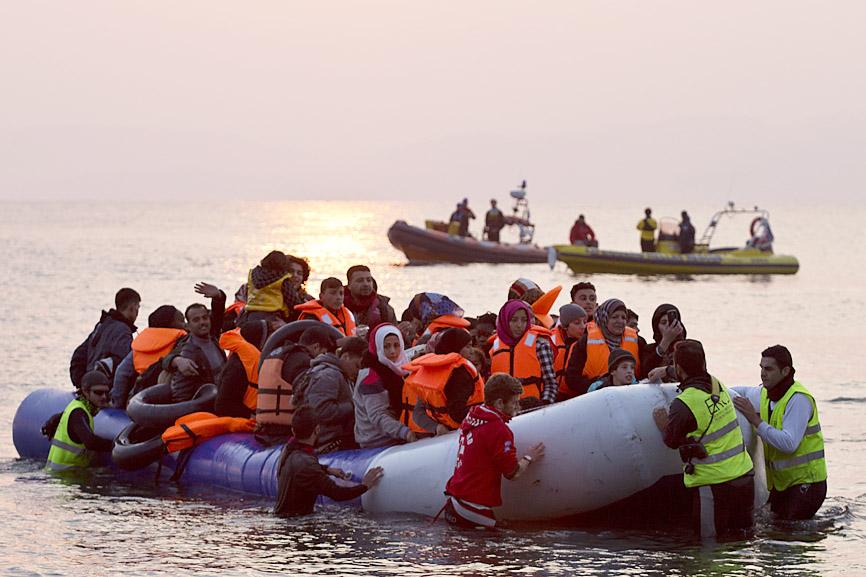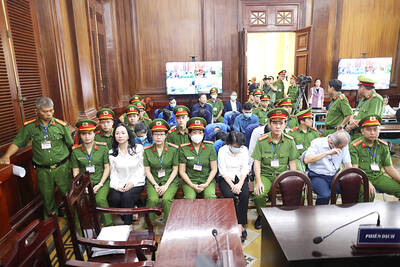Thousands of refugees are at risk of being left homeless by the termination of an EU-funded program providing cash assistance and temporary shelter to people granted asylum in Greece.
Appeals from aid groups have mounted, which fear that more than 2,000 men, women and children will face destitution if action is not taken.
“It’s extremely concerning that recognized refugees in Greece are being turned on to the streets amidst a global pandemic,” International Rescue Committee director of policy and advocacy in Europe Imogen Sudbery said. “Without necessary documentation, access to information, language skills or other essential means of becoming self-reliant they are at grave risk of becoming homeless and unemployed.”

Photo: AP
Deprived of any safety net, families forced to leave organized accommodation have resorted in recent weeks to sleeping rough in parks and public squares.
Working contracts for hotels hosting recognized refugees under the EU-funded Filoxenia program first ended in December last year, with other hotels following suit in January and last month.
About 750 men, women and children are due to exit the temporary shelters in the coming days as the scheme finally wraps up, the committee said.
“What we’re seeing reflects the wholesale lack of national integration policy that, incredibly, is still a problem so many years after this crisis began,” said Lefteris Papagiannakis, who focuses on refugee issues at non-governmental organization Solidarity Now. “They’re images we’ve seen before, and will see again, unless real efforts are made to include these people in our society.”
Integration of the estimated 80,000 refugees in Greece is now regarded as the single biggest challenge for a country long on the frontline of migrant flows from Asia, Africa and the Middle East.
Since assuming power in July 2019, the Greek government has focused on accelerating asylum claims and relieving overcrowded camps on frontline Aegean islands by transferring successful asylum applicants to the mainland.
Under a law passed aimed at freeing up space in island reception centres, recognized refugees have only a month to make the transition from organized accommodation to being self-sufficient in non-assisted living facilities.
The UN High Commissioner for Refugees has expressed repeated concerns over assistance ending prematurely.
Access to employment and social welfare schemes is often blighted by the hurdles faced in securing things as simple as a tax number or bank account — obstacles heightened by the COVID-19 pandemic.
In theory, recognized refugees can travel to other parts of Europe, but under EU law, they can remain in another member state for only three months before running the risk of being sent back to Greece.
Greek Prime Minister Kyriakos Mitsotakis’ administration said that it would unveil a national integration strategy imminently.
Asked to comment on the risks posed by the closure of hotels for the refugees, Greek Ministry of Migration senior official Manos Logothetis said that Athens was acting according to plan.
“The Filoxenia program was always going to be phased out,” he said. “We have been given the thumbs up and congratulated by the EU for not only doing it, but doing it on time.”

Republican US lawmakers on Friday criticized US President Joe Biden’s administration after sanctioned Chinese telecoms equipment giant Huawei unveiled a laptop this week powered by an Intel artificial intelligence (AI) chip. The US placed Huawei on a trade restriction list in 2019 for contravening Iran sanctions, part of a broader effort to hobble Beijing’s technological advances. Placement on the list means the company’s suppliers have to seek a special, difficult-to-obtain license before shipping to it. One such license, issued by then-US president Donald Trump’s administration, has allowed Intel to ship central processors to Huawei for use in laptops since 2020. China hardliners

A top Vietnamese property tycoon was on Thursday sentenced to death in one of the biggest corruption cases in history, with an estimated US$27 billion in damages. A panel of three hand-picked jurors and two judges rejected all defense arguments by Truong My Lan, chair of major developer Van Thinh Phat, who was found guilty of swindling cash from Saigon Commercial Bank (SCB) over a decade. “The defendant’s actions ... eroded people’s trust in the leadership of the [Communist] Party and state,” read the verdict at the trial in Ho Chi Minh City. After the five-week trial, 85 others were also sentenced on

‘DELUSIONAL’: Targeting the families of Hamas’ leaders would not push the group to change its position or to give up its demands for Palestinians, Ismail Haniyeh said Israeli aircraft on Wednesday killed three sons of Hamas’ top political leader in the Gaza Strip, striking high-stakes targets at a time when Israel is holding delicate ceasefire negotiations with the militant group. Hamas said four of the leader’s grandchildren were also killed. Ismail Haniyeh’s sons are among the highest-profile figures to be killed in the war so far. Israel said they were Hamas operatives, and Haniyeh accused Israel of acting in “the spirit of revenge and murder.” The deaths threatened to strain the internationally mediated ceasefire talks, which appeared to gain steam in recent days even as the sides remain far

RAMPAGE: A Palestinian man was left dead after dozens of Israeli settlers searching for a missing 14-year-old boy stormed a village in the Israeli-occupied West Bank US President Joe Biden on Friday said he expected Iran to attack Israel “sooner, rather than later” and warned Tehran not to proceed. Asked by reporters about his message to Iran, Biden simply said: “Don’t,” underscoring Washington’s commitment to defend Israel. “We are devoted to the defense of Israel. We will support Israel. We will help defend Israel and Iran will not succeed,” he said. Biden said he would not divulge secure information, but said his expectation was that an attack could come “sooner, rather than later.” Israel braced on Friday for an attack by Iran or its proxies as warnings grew of